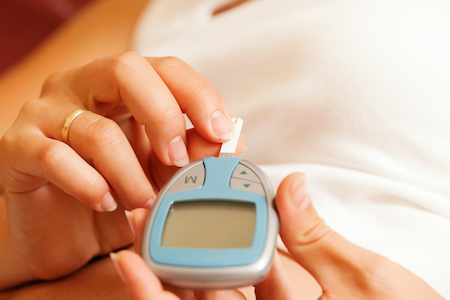
Gestational diabetes: Glucose challenge test
Gestational diabetes is a serious pregnancy complication that can affect the health of both mom and baby, so healthcare providers tend to be very vigilant about detecting it with a series of tests called the Glucose Challenge Test (GCT), and Glucose Tolerance Test (GTT).
What is gestational diabetes?
Gestational diabetes is the temporary onset of diabetes, a condition that affects your body's ability to effectively process sugar, that sometimes occurs during pregnancy. Gestational diabetes is among the most common pregnancy complications, and although there is no magic cure, it can very much be managed by diet, exercise and occasionally medication. Most women will notice their gestational diabetes disappear after they give birth.
How do healthcare providers detect gestational diabetes?
Gestational diabetes generally doesn't develop until the second half of pregnancy, so most healthcare providers ask pregnant women to take the initial screen, the Glucose Challenge Test, around Week 24. If this raises a red flag, you'll probably have to take the Glucose Tolerance Test shortly thereafter to confirm or deny a diagnosis.
Glucose Challenge Test
At the Glucose Challenge Test, generally administered between weeks 24 and 28 of pregnancy, your healthcare provider will ask you to drink 5 or so ounces of a sugary substance (Glucose solution), and then wait an hour in the office before you'll have a blood sample drawn from your arm, which will be tested for its blood sugar level. If the concentration of sugar in your blood is greater than 140 mg/dL, your healthcare provider will probably recommend the Glucose Tolerance Test.
Glucose Tolerance Test
Prior to taking the Glucose Tolerance Test, your healthcare provider will more than likely ask you to avoid eating for at least the eight hours leading up to the test. Once there, you'll be asked to drink about 8 ounces of a similar Glucose solution, and your blood will then be tested 1, 2, and 3 hours after you take the test - your blood sugar is considered high if it is over 180 mg/dL at 1 hour, 155 mg/dL after 2 hours, and 140 mg/dL after 3 - if you fail any two of these your healthcare provider will probably diagnose you with gestational diabetes.
Prognosis
Although gestational diabetes can be a serious complication of pregnancy, most women who develop it give birth to perfectly healthy babies and remain healthy themselves - it's most important to follow your healthcare provider's instructions if you are diagnosed with gestational diabetes in order to most effectively manage it.




